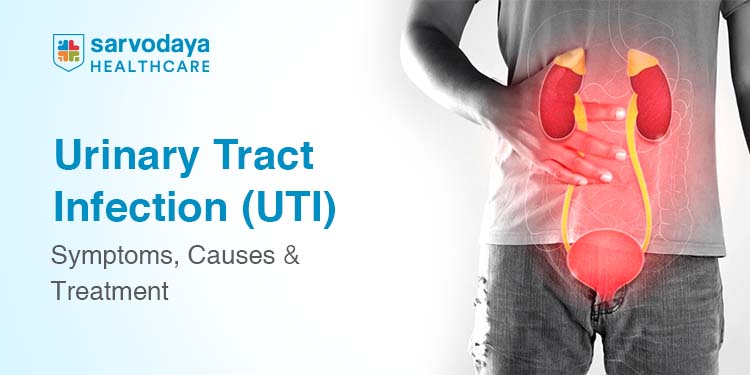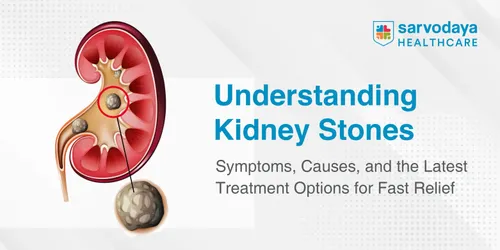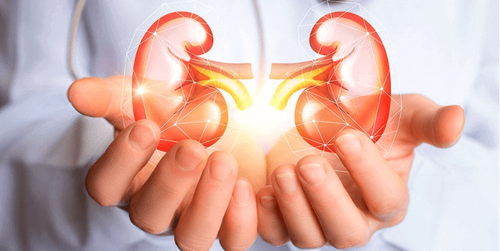In this blog, we explore urinary tract infection symptoms, the causes behind it, and the treatment options available for it.
Understand Urinary Tract Infection
Urinary tract infections occur due to bacterial infection, most commonly caused when Escherichia coli (E. coli) enters the body and multiplies in any part of the urinary system. These parts include the kidneys, the ureters, the bladder, and the urethra. While the body does have defences to prevent this infection, these defences may fail at times, leading to inflammation and other uncomfortable symptoms.The urinary system is divided into the upper and lower tracts. UTIs majorly affect the lower urinary tract, especially the bladder and urethra. However, if it is not treated, it may spread to the kidneys, which may lead to serious complications like kidney damage or even sepsis. Hence, early detection and the right treatment are crucial for UTIs.
Urinary Tract Infection Symptoms – Early Red Flags
A urinary tract infection does not always show symptoms in its early stages, but when it does, it can quickly escalate if not paid attention to. Recognising the signs early can prevent the infection from spreading and worsening.The most commonly observed urinary tract infection symptoms are:
- A continuous urge to urinate even when the bladder is not filled
- A burning sensation or pain during urination
- Passing small amounts of urine frequently
- Urine that is cloudy or dark in appearance, or has a strong odour
- A feeling of pain or pressure in the lower abdomen or pelvic area
- Fatigue, especially if the infection is recurring or ongoing
- Fever and chills, as the infection reaches the kidneys
UTI Symptoms in Females – Why Women Are More at Risk
UTIs are more common in women than men, and there are biological reasons behind this. As the female urethra is shorter and at a closer distance to the anus, it is easier for bacteria to enter the urinary tract. Additionally, hormonal changes during menstruation, pregnancy, and menopause may further increase the risk.Some of the commonly seen UTI symptoms female patients report are:
- A burning or painful sensation while urinating
- Increased frequency and urgency of urination
- Pelvic discomfort or lower abdominal pain
- Cloudy or strong-smelling urine
- Discomfort during sexual intercourse
- Symptoms worsening after using certain feminine hygiene products
- Increased vulnerability during pregnancy or after menopause
UTIs in Men – Common Causes and Recommended Therapy
While UTIs are more common in women, men can also get them, especially with increasing age or underlying health issues. UTIs in men are usually considered complicated and often require a thorough examination to rule out prostate involvement, obstructions, or other urological conditions.Some of the common causes of UTIs in men include:
- An enlarged prostate blocks the flow of urine
- Kidney stones or urinary tract obstructions
- Use of urinary catheters
- Anal intercourse or poor hygiene
- Uncontrolled diabetes or a weakened immune system
Depending on the bacterial strain that led to infection and its severity, UTI antibiotics for men are prescribed. Some frequently recommended UTI antibiotics for men include:
- Nitrofurantoin
- Trimethoprim-sulfamethoxazole
- Ciprofloxacin or other fluoroquinolones (for more severe infections)
Men must complete the full course of UTI antibiotics, even if symptoms start to improve, as incomplete treatment can lead to recurrence or antibiotic resistance.
Diagnosis – How a Urologist Confirms a UTI
If you or a loved one experiences symptoms of a UTI, the next step is a proper medical diagnosis. This helps determine whether it's a simple infection or a more serious condition that needs detailed care.The diagnostic process for a UTI typically includes:
- Medical history and symptom review: Your doctor will ask about the duration and type of UTI symptoms female or male patients have, past infections, and any risk factors.
- Physical examination: In some cases, a gentle abdominal or pelvic exam may be done to assess pain or tenderness.
- Urinalysis: A sample of urine is tested for white blood cells, red blood cells, and bacteria.
- Urine culture: It is done to identify the exact bacteria that caused the infection and to check which Urinary tract infection treatments will be the most effective.
- Imaging tests (if needed): In recurrent or complicated cases, ultrasound or CT scans may be used to look for structural problems, blockages, or kidney involvement.
Treatment Road-Map – Home Care to Hospital Care
Once a UTI is diagnosed, timely and appropriate treatment is essential to relieve symptoms and prevent complications. The approach may vary based on the patient’s age, gender, infection severity, and medical history.Here is how treatment typically progresses:
- Hydration: Increased fluid intake helps flush bacteria from the urinary tract.
- Pain management: Mild pain relievers can help manage abdominal discomfort or burning sensations during urination.
- Antibiotics: For most patients, a short course of antibiotics is effective. The choice of medicine depends on the bacteria identified. For example, UTI antibiotics for men are often prescribed for a longer duration and may involve stronger medications if the prostate is involved.
- Monitoring: If symptoms persist beyond a few days of treatment, follow-up tests may be required.
- Hospitalisation: In severe or complicated infections, especially in children or elderly patients, hospital admission with intravenous antibiotics may be needed.
- Specialist referral: Recurrent or complex cases are referred to the Best Urologist in Faridabad or the Best Urologist in Delhi NCR for advanced evaluation and care.
Prevention Tips to Keep UTIs at Bay
Here are five effective tips to reduce your chances of getting a UTI:- Stay well-hydrated: Drink at least 2 to 3 liters of water daily to keep your urinary tract flushed and clean.
- Don’t hold in urine: Empty your bladder regularly to prevent bacteria from building up inside.
- Maintain proper hygiene: While wiping, wipe front to back after toilet use to avoid spreading bacteria.
- Urinate after intercourse: This helps flush out any bacteria that may have entered the urethra.
- Wear breathable fabrics: Choose cotton underwear and avoid tight-fitting clothes that trap moisture.
Conclusion
Urinary tract infections can start as a minor discomfort but can quickly turn into a serious health issue if left untreated. Recognising urinary tract infection symptoms, understanding individual risk factors, and seeking timely treatment are key to fast recovery and long-term urinary health. Whether it’s a first-time infection or a recurring issue, being proactive makes all the difference.If you or a loved one is experiencing UTI symptoms, female or male-specific, or needs paediatric UTI treatment, Sarvodaya Hospital offers comprehensive care backed by modern diagnostics and a skilled team of specialists. As the Best Urinary Treatment Hospital in Faridabad and widely regarded as the Best Urology Hospital in Faridabad, Delhi NCR, Sarvodaya Hospital provides personalised treatment plans, advanced urological procedures, and compassionate support at every step.
A preventive consultation with the Best Urologist in Faridabad can help you avoid long-term complications and ensure peace of mind. Don’t wait for your symptoms to worsen; take a step toward better urinary health today.























